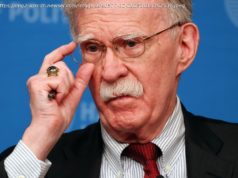WASHINGTON — As President Donald Trump basks in widespread approval for the U. S.-led missile strike aimed at Syrian chemical-weapons installations, his adm
WASHINGTON — As President Donald Trump basks in widespread approval for the U. S.-led missile strike aimed at Syrian chemical-weapons installations, his administration still faces a quandary over U. S. policy toward that country’s civil war — and some sharp questions about the president’s war powers.
Trump has yet to articulate a long-term U. S. strategy for dealing with the multi-sided war in Syria, which has lasted more than seven years, killed hundreds of thousands of people and triggered an epic refugee crisis.
Only days before the missile attack, Trump called for a rapid U. S. troop withdrawal from Syria, which critics said would yield control of the country to Russia and Iran, allies of Syrian President Bashar Assad. Sen. John McCain, R-Ariz., was among those who said that Trump’s words had “emboldened” Assad to use chemical weapons.
Several lawmakers asserted Sunday that the president should have sought congressional approval for the missile strike, launched in response to reports of deadly poison-gas strikes on a rebel-held suburb of Damascus. Congress, however, repeatedly has ducked votes on Syria policy since the fighting began there in March 2011.
But even some people who have expressed vehement disagreement with Trump’s previous actions voiced support for the strike, which was carried out in coordination with the United Kingdom Britain and France.
Former CIA Director John Brennan was among those who praised the action as “proportional and necessary to send a signal.”
Brennan, who is now an analyst for NBC and spoke on the network’s “Meet the Press,” said “the administration’s actions against Syria were appropriate — and I tend to be a critic of this administration.”
In the longer term, though, Brennan said solutions in Syria were likely to be evasive.
“I think we have to continue to put the pressure on the Assad regime, try to hit them when they use chemical weapons, but not get involved in another full-scale war in the Middle East,” he said.
Pentagon officials have said that the strike significantly damaged Syria’s capacity to research and produce chemical weapons. But they have not claimed that the attack eliminated Assad’s ability to carry out future chemical attacks.
Within the administration, some painted the strike as a possible portent of more American involvement in the Syrian conflict. The U. S. ambassador to the United Nations, Nikki Haley, said more use of chemical weapons against Syrian civilians by Assad — whose forces have carried out a number of such attacks in the course of the war — could trigger further U. S. military action.
“Should he use it again, the president (Trump) has made it very clear that the United States is locked and loaded and ready to go,” Haley said on “Fox News Sunday.”
As she and other senior Trump aides are often called upon to do, Haley struck a careful balance between acknowledging what the president has said publicly and making predictions about future intentions.
Haley acknowledged that Trump’s goal is to “see American troops come home.” But a withdrawal would not take place before the militants of Islamic State had been defeated and further use of chemical weapons precluded, she said — both prospects that military officials have warned remain far in the future.
“We of course know our work in Syria is not done,” she said.
Having secured France’s and the U. K.’s participation in the missile strike, Trump might be more obliged to heed their counsel on long-term objectives in Syria.
French President Emmanuel Macron said in a broadcast interview Sunday that despite Trump’s talk of a U. S. troop withdrawal, “we have convinced him that it is necessary to stay for the long term.”
Haley, who has been among the strongest proponents of punishing Russia for backing Assad, argued — as she has frequently done in the Security Council — that Russia shares blame for the chemical attack, even if it had no direct involvement.
“Assad knew that Russia had its back,” she said in the Fox interview, adding that the Syrian leader “got reckless” in the suspected chemical attack last week in the Damascus suburb of Douma.
The escalation that the missile strike could presage has generated concerns among some members of Congress.
One of the sharpest critiques came from Sen. Tim Kaine, D-Va., who was Hillary Clinton’s running mate in the 2016 election.
“President Trump is not a king — he’s a president,” Kaine said on CBS’ “Face the Nation.” Trump is “supposed to come to Congress to seek permission to initiate a war.”
Some of Trump’s fellow Republicans also expressed unease over the potential for U. S. escalation in Syria without legislative input. Sen. Joni Ernst of Iowa, a veteran of the Iraq war, supported the strikes but said on NBC’s “Meet the Press” that she was “uncomfortable going forward.”
Referring to a congressional authorization for the use of military force, she said: “As many of my colleagues have also stated, we need a new AUMF,” or Authorization for Use of Military Force.
Trump was seemingly motivated to act, as he had been a year earlier after a similar chemical attack, by images of the lifeless bodies of children said to have been stricken by poison gas. His initial response to the episode faulted Russia for backing Assad.
Russia, however, signaled defiance. A Kremlin statement Sunday quoted Russian President Vladimir Putin as having told Iranian leader Hassan Rouhani that the missile strike was a violation of the United Nations charter and that future such actions “will inevitably lead to chaos in international relations.”
Like many of Trump’s actions as president, the missile raid was cast by the president’s aides as a sharp contrast with former President Obama’s policies.
During his campaign, Trump hammered at Obama’s failure to enforce the “red line” he had drawn against Assad’s use of chemical weapons to kill his own people.
Home
United States
USA — Political Trump praises ‘perfectly carried out’ missile strike, but lacks an overall strategy...






